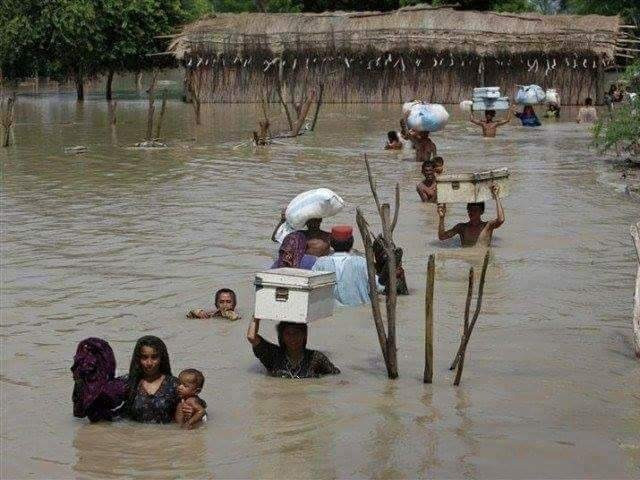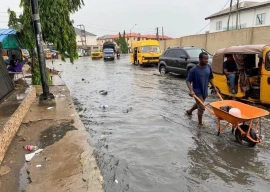
Several UN human rights experts have called on states to step up their assistance to monsoon flood victims in Pakistan and ensure that international recovery efforts are guided by human rights law and standards.
One-third of the country has been under water and more than 33 million people have been affected by the floods, including 1,500 people already reported killed and over 660,000 people displaced in camps.
Over 1.5 million houses have been damaged or destroyed in Sindh province alone, and more than 750,000 livestock destroyed and 1.2 million hectares of agricultural land damaged by the floods. Health officials are warning that outbreaks of waterborne diseases and epidemics are imminent.
"All countries that have contributed to the global climate crisis have an international obligation to assist #Pakistan with its recovery,” urge @UN_SPExperts. “We add our voices to those calling for international solidarity with the victims of the #PakistanFloods." pic.twitter.com/2OTPRH4RIL
— UN Geneva (@UNGeneva) September 21, 2022
“We add our voices to those calling for international solidarity with the victims of the floods in Pakistan,” the experts said. “The global climate crisis has contributed to these terrible floods and caused unprecedented human suffering in Pakistan. All countries that have contributed to the global climate crisis have an international obligation to assist Pakistan with its recovery,” they said.
The experts said that compared to many industrialised countries, Pakistan and its people had only modestly contributed to global warming that was resulting in extreme weather events and climate change.
Their remarks come in the wake of the UN Secretary General’s call for "massive" global support to Pakistan and a separate call for the creation of an international fund to help recovery of climate change-affected states.
Read more: Pakistan gets another debt relief of $160m from Japan
The experts also emphasised the relevance of proposals to increase international support for the establishment of social protection floors, such as through the global fund for social protection called for by the International Labour Conference, to strengthen the resilience of countries against such shocks.
“It is important that international relief efforts are guided by human rights, prioritising humanitarian assistance and relief to the most vulnerable. In re-housing those who have been left homeless by climate change-induced monsoon floods, Pakistan needs to renew attention to land rights and security of tenure,” the experts said.
They said the poor and vulnerable were often forced to live in informal settlements located in areas particularly at risk during natural disasters. “Local policies and practices such as forced evictions or uncontrolled deforestation can make things worse when climate change impacts hit. Many people who have been affected by the floods have no titles to land and homes, so they have chosen to remain closer to their residences, putting themselves and their families at risk,” the experts said.
Also read: First flight of flood relief assistance from Russia lands in Karachi
Last year, a group of UN experts called on Pakistan to halt mass evictions along Karachi’s watercourses, which eventually left thousands of people homeless and forced others to remain in the rubble of partially demolished homes.
“Regularising informal housing would add to the bulwark of building a society equipped to withstand the impact of climate-induced events,” the experts said.
PM calls for continued support of int’l community

Meanwhile, Prime Minister Shehbaz Sharif emphasised the need for continued support from the international community, not only in the immediate recovery and relief efforts, but also during the subsequent reconstruction and rehabilitation phase.
The prime minister, in a meeting with US Special Presidential Envoy on Climate John Kerry, conveyed gratitude for immediate US assistance in the wake of the devastating floods in Pakistan.
The meeting was held on Tuesday on the sidelines of the 77th Session of the United Nations General Assembly (UNGA).
Noting that “the devastating floods have made Pakistan ground zero of climate change”, the prime minister appreciated John Kerry’s personal leadership in raising awareness and seeking solutions to the climate change crisis.
He acknowledged the important role being played by the Biden Administration to address climate change.
The prime minister stressed that Pakistan contributed less than 1% of the global greenhouse gas emissions; yet it was among the ten most vulnerable countries to climate change.
The prime minister underscored the importance of US leadership in enabling the developing countries including Pakistan to deliver on their climate action commitments under the Paris Agreement by providing sufficient tools in the shape of Climate Finance, Technology Transfer and Capacity Building Assistance.
Special Envoy Kerry expressed solidarity with the people and Government of Pakistan and reaffirmed the US administration’s continued support in facing the challenges due to the floods.
He said that the US was ready to engage with Pakistan to collaborate in rebuilding resilient infrastructure as well as other forms of support that would avert such a crisis in future.
Both sides agreed to continue to closely focus on climate change and energy dialogue.
(With additional input from APP)
1724760612-0/Untitled-design-(12)1724760612-0-405x300.webp)



















COMMENTS
Comments are moderated and generally will be posted if they are on-topic and not abusive.
For more information, please see our Comments FAQ